American Chinese cuisine is a style of Chinese cuisine developed by Americans of Chinese descent. The dishes served in many North American Chinese restaurants are adapted to American tastes and differ significantly from those found in China. Of the various regional cuisines in China, Cantonese cuisine has been the most influential in the development of American Chinese food, especially that of Toisan, the origin of most early immigrants...............
History............
Chinese immigrants arrived in the United States to work as miners and railroad workers. As the large groups of Chinese immigrants arrived, laws were put in place preventing them from owning land. They mostly lived together in ghettos, individually referred to as "Chinatown". Here the immigrants started their own small businesses, including restaurants and laundry services.
The restaurants in smaller towns (mostly owned by Chinese immigrants) served food based on what their customers requested, anything ranging from pork chop sandwiches and apple pie, to beans and eggs. Many of these small-town restaurant owners were self-taught family cooks who improvised on different cooking methods and ingredients
By the 1920s, this cuisine, particularly chop suey, became popular among middle-class Americans. However, after World War II it began to be dismissed for not being "authentic." Late 20th century tastes have been more accommodating. Take away food became popular amongst Americans, Chinese food becoming a favourite "take out" option. By this time it became evident that Chinese restaurants no longer catered mainly for Chinese customers.
Differences from other regional cuisines in China.
American Chinese food builds from styles and food habits brought from the southern province of Guangdong, typically the Toisan district of Toisan, the origin of most Chinese immigration before the closure of immigration from China in 1924. These Chinese families developed new styles and used readily available ingredients, especially in California. The types of Chinese American cooking served in restaurants was different from the foods eaten in Chinese American homes.
A Chinese buffet restaurant in the United States.
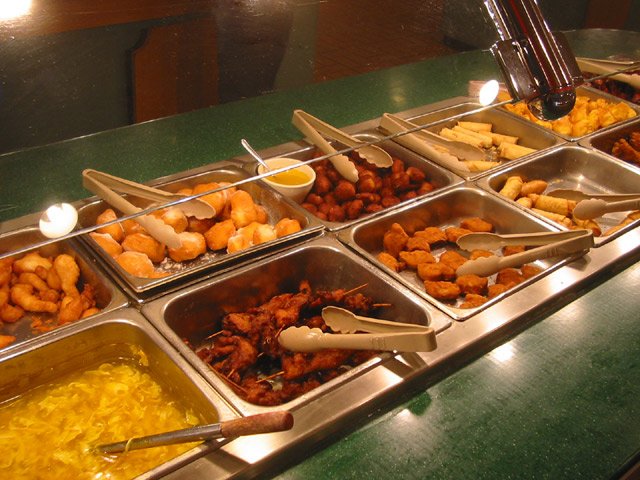
American Chinese cuisine takes advantage of ingredients not native to and very rarely used in China. One such example is the common use of western broccoli (Chinese: 西蘭; pinyin: xīlán) instead of Chinese broccoli (Gai-lan, 芥蘭; jièlán) in American Chinese cuisine. Occasionally, western broccoli is also referred to as sai1 laan4 fa1 in Cantonese (西蘭花) in order not to confuse the two styles of broccoli. Among Chinese speakers, however, it is typically understood that one is referring to the leafy vegetable unless otherwise specified.
Carryout Chinese food is commonly served in a paper carton with a wire bail, known as the oyster pail.
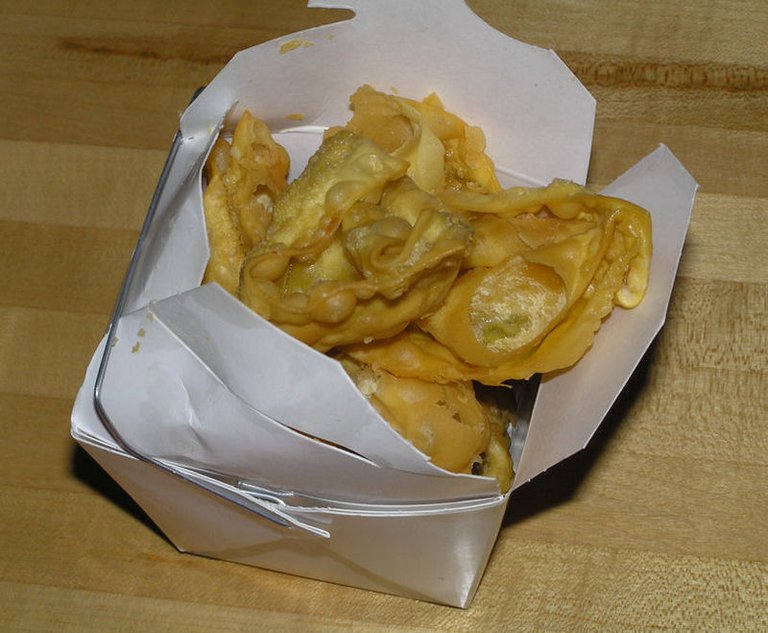
Dishes.......
American Chinese restaurant menu items
Dishes that often appear on American Chinese restaurant menus include:
Almond chicken - chicken breaded in batter containing ground almonds, fried and served with almonds and onions.[15]
General Tso's chicken – chunks of chicken that are dipped in a batter and deep-fried and seasoned with ginger, garlic, sesame oil, scallions, and hot chili peppers. Believed to be named after Qing Dynasty statesman and military leader Zuo Zongtang, often referred to as General Tso.
Sesame chicken – boned, battered, and deep-fried chicken which is then dressed with a translucent red or orange, sweet and mildly spicy sauce, made from soy sauce, corn starch, vinegar, chicken broth, and sugar.
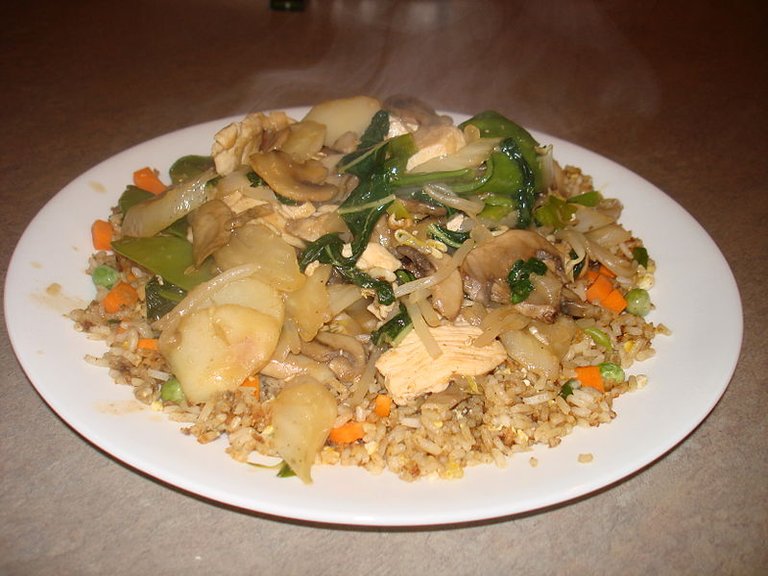
Chop suey – connotes "assorted pieces" in Chinese. It is usually a mix of vegetables and meat in a brown sauce but can also be served in a white sauce.
Crab rangoon – fried wonton skins stuffed with (usually) artificial crab meat (surimi) and cream cheese.
Wonton strips are commonly served complimentary along with duck sauce and hot mustard
Fortune cookie – invented in California as a westernized version of the Japanese omikuji senbei,[16] fortune cookies have become sweetened and found their way to many American Chinese restaurants.
Royal beef – deep-fried sliced beef, doused in a wine sauce and often served with steamed broccoli.

Beef & Broccoli - flank steak cut into small pieces, stir-fried with broccoli, and covered in a dark sauce made with soy sauce and oyster sauce and thickened with cornstarch.[23][24][25]
Sweet roll - yeast rolls, typically fried, covered in granulated sugar or powdered sugar. Some variants are stuffed with cream cheese or icing.
Sushi - despite being part of traditional Japanese cuisine, some American Chinese restaurants serve various types of sushi, usually on buffets.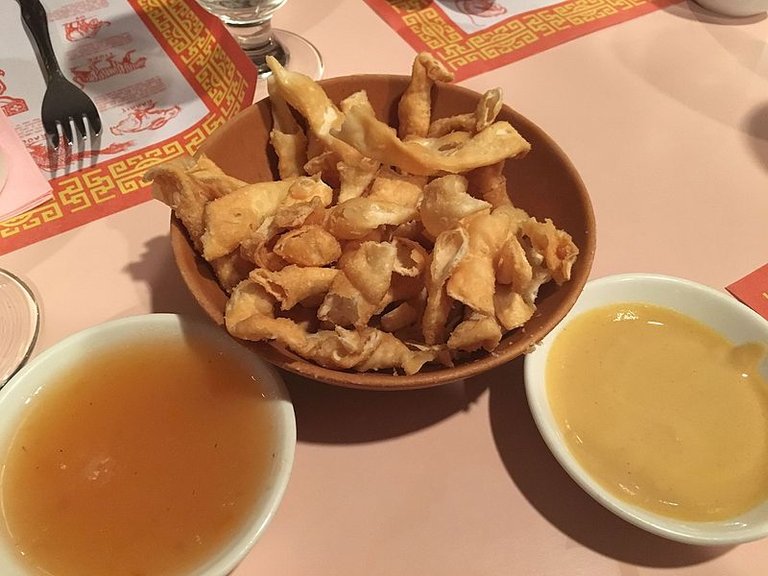
Regional American Chinese dishes...........
Chow mein sandwich – sandwich of chow mein and gravy (Southeastern Massachusetts, Rhode Island).
Chop suey sandwich – sandwich of chicken chop suey on a hamburger bun (North Shore of Massachusetts).
St. Paul sandwich – egg foo young patty in plain white sandwich bread (St. Louis, Missouri.
North American versions found in China...
Cashew chicken – Stir fried tender chicken pieces with cashews.
Chow mein – literally means "stir-fried noodles". Chow mein consists of fried crispy noodles with bits of meat and vegetables. It can come with chicken, pork, shrimp or beef.
Egg foo young – a Chinese-style omelet with vegetables and meat, usually served with a brown gravy. While some restaurants in North America deep-fry the omelet, versions found in Asia are more likely to fry in the wok.
Egg foo young.
Regional variations...
San Francisco
Since the early 1990s, many American Chinese restaurants influenced by California cuisine have opened in San Francisco and the Bay Area. The trademark dishes of American Chinese cuisine remain on the menu, but there is more emphasis on fresh vegetables, and the selection is vegetarian-friendly.In addition, many restaurants serving more native-style Chinese cuisines exist, due to the high numbers and proportion of ethnic Chinese in San Francisco and the Bay Area. Restaurants specializing in Cantonese, Sichuanese, Hunanese, Northern Chinese, Shanghainese, Taiwanese, and Hong Kong traditions are widely available, as are more specialized restaurants ..
Beef with broccoli
American Chinese chain restaurants..
China Coast – Closed in 1995; owned by General Mills Corp., formerly 52 locations throughout the United States
Chinese Gourmet Express - throughout the United States
Leeann Chin – Minnesota and Wisconsin; owned at one time by General Mills Corp.[30]
Manchu Wok – Throughout the United States and Canada, as well as Guam, Korea and Japan
Panda Express – Throughout the United States, some locations in Mexico[31]
Pei Wei Asian Diner – Throughout the United States; a subsidiary of P.F. Chang's
P. F. Chang's China Bistro – Throughout the United States; features California-Chinese fusion cuisine....
A typical Panda Express meal: Kung Pao chicken, orange chicken, chow mein and steamed vegetables.
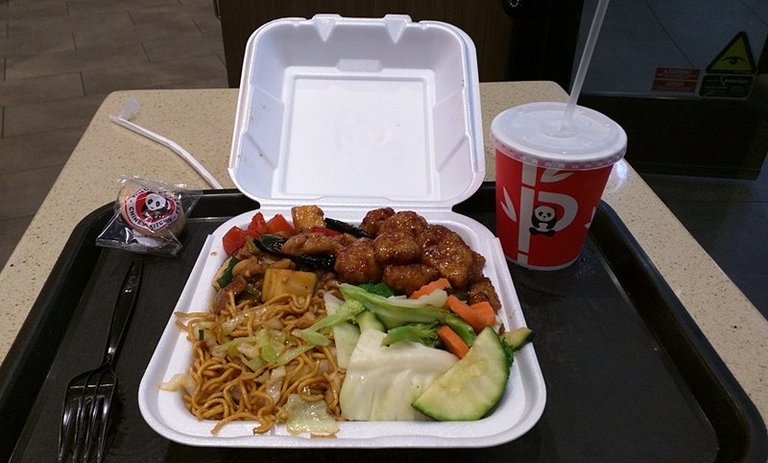
PLZ FOLLOW ME @danishrafiq
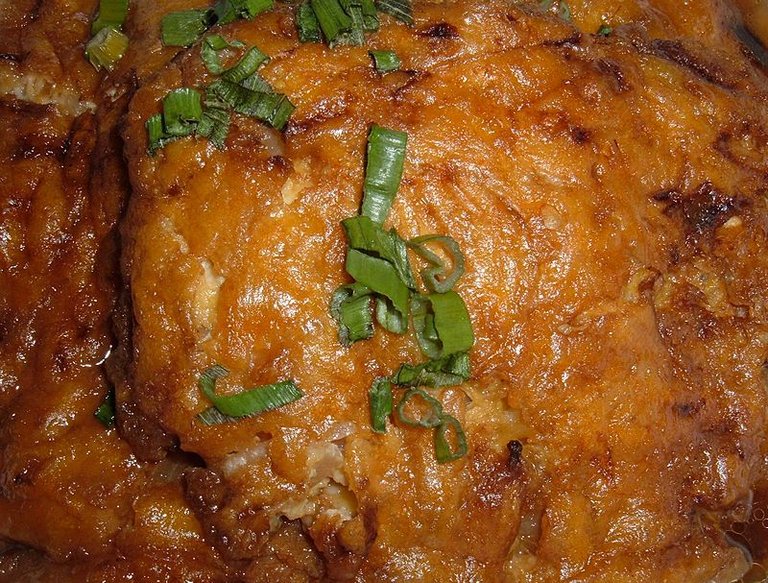

The good ones will win out in the long-term buddy
@danishrafiq
FOLLOW ME @danishrafiq
Mouthwatering, wish I had the ingredients right now... @danishrafiq
Follow me @danishrafiq